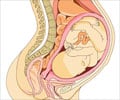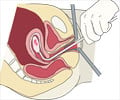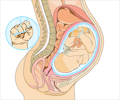How can Miscarriage be Treated?
- If the USG reveals that miscarriage is complete and the uterus is empty, then no further treatment is usually required.
- Occasionally, the uterus is not completely emptied and there is continued bleeding, pain or a fever, so a dilation and curettage (D&C) procedure is performed to avoid the risk of serious infection. The fetal tissue must be removed from the uterus. This procedure is done under anesthesia, the cervix is gradually dilated and the tissue is gently removed.
- Certain medications (misoprostol) can be prescribed, as an alternative to D&C, to cause the body to expel the contents in the uterus.
- In cases of threatened abortion, bed rest and medicines to reduce pain may be prescribed until the bleeding or pain has stopped. A cervical cerclage is required in women with cervical incompetence.
- If a chromosomal problem is found in one or both spouses, then counseling regarding future risks is the only option. There is currently no method to correct genetic problems.
- If a structural problem is encountered with the uterus, surgical correction could be contemplated. It should be emphasized that just because a structural abnormality is found, it does not necessarily mean that it is the cause of miscarriage.
- Adequate control of diabetes and thyroid disease is critical in trying to prevent recurrent pregnancy loss in women with those conditions.
- For women with antibody problems, certain medicines have been found to be useful in achieving successful pregnancy outcomes. Blood thinners, such as heparin, baby aspirin, and even the addition of steroids can, prevent further pregnancy loss in some cases.






















